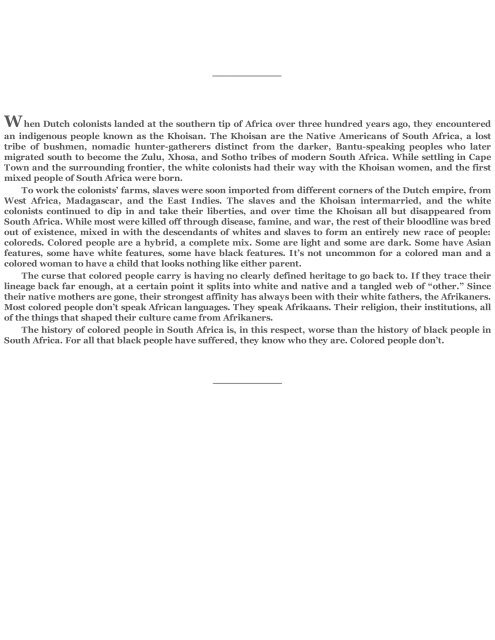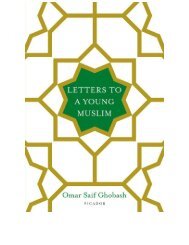You also want an ePaper? Increase the reach of your titles
YUMPU automatically turns print PDFs into web optimized ePapers that Google loves.
W hen Dutch colonists landed at the southern tip of Africa over three hundred years ago, they encountered<br />
an indigenous people known as the Khoisan. The Khoisan are the Native Americans of South Africa, a lost<br />
tribe of bushmen, nomadic hunter-gatherers distinct from the darker, Bantu-speaking peoples who later<br />
migrated south to become the Zulu, Xhosa, and Sotho tribes of modern South Africa. While settling in Cape<br />
Town and the surrounding frontier, the white colonists had their way with the Khoisan women, and the first<br />
mixed people of South Africa were born.<br />
To work the colonists’ farms, slaves were soon imported from different corners of the Dutch empire, from<br />
West Africa, Madagascar, and the East Indies. The slaves and the Khoisan intermarried, and the white<br />
colonists continued to dip in and take their liberties, and over time the Khoisan all but disappeared from<br />
South Africa. While most were killed off through disease, famine, and war, the rest of their bloodline was bred<br />
out of existence, mixed in with the descendants of whites and slaves to form an entirely new race of people:<br />
coloreds. Colored people are a hybrid, a complete mix. Some are light and some are dark. Some have Asian<br />
features, some have white features, some have black features. It’s not uncommon for a colored man and a<br />
colored woman to have a child that looks nothing like either parent.<br />
The curse that colored people carry is having no clearly defined heritage to go back to. If they trace their<br />
lineage back far enough, at a certain point it splits into white and native and a tangled web of “other.” Since<br />
their native mothers are gone, their strongest affinity has always been with their white fathers, the Afrikaners.<br />
Most colored people don’t speak African languages. They speak Afrikaans. Their religion, their institutions, all<br />
of the things that shaped their culture came from Afrikaners.<br />
The history of colored people in South Africa is, in this respect, worse than the history of black people in<br />
South Africa. For all that black people have suffered, they know who they are. Colored people don’t.
















